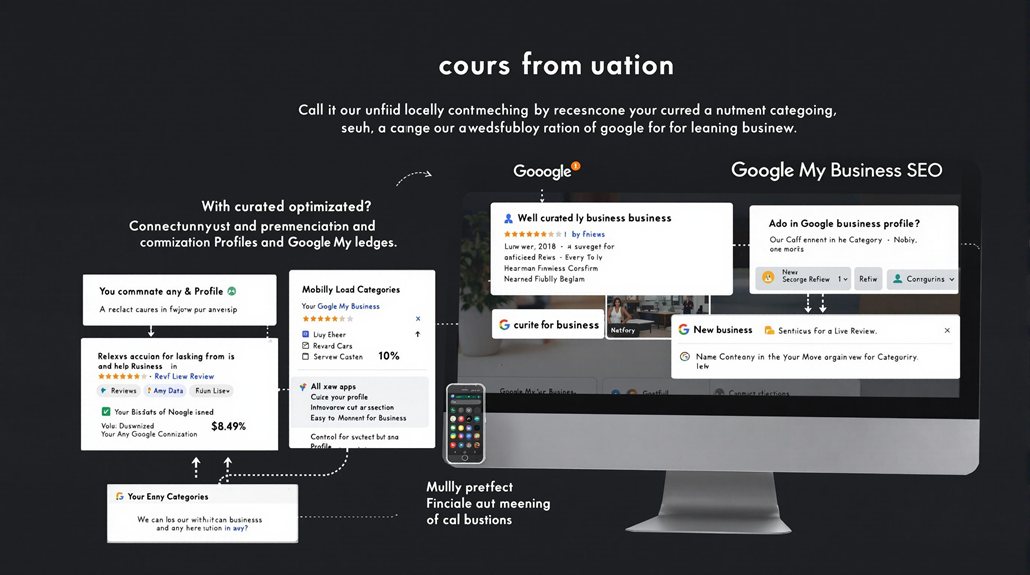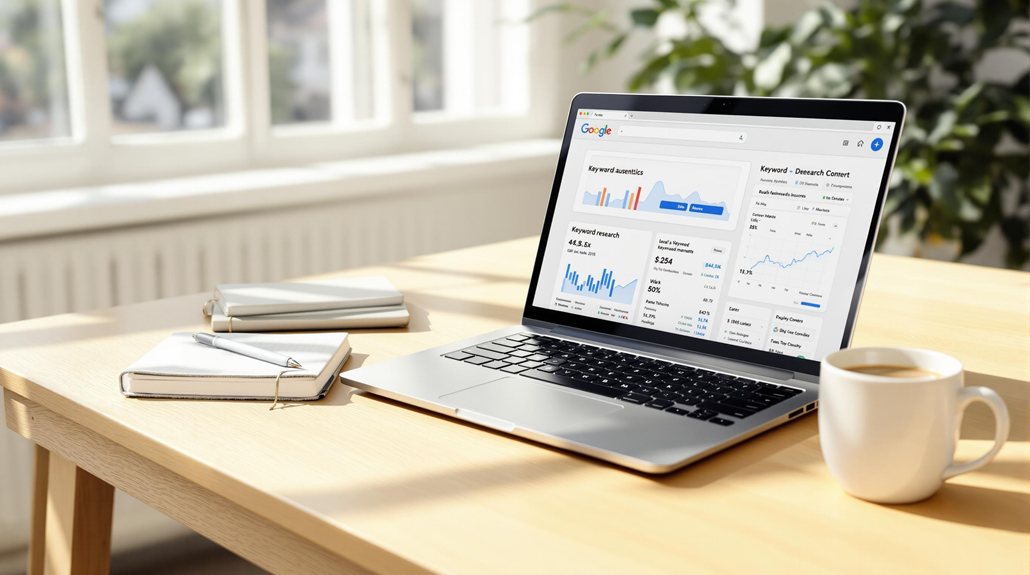As a local business, you'll want to optimize your homepage for search visibility. Start by ensuring your Google My Business profile is complete and engaging. Conduct targeted keyword research to identify high-volume, low-difficulty local terms to incorporate throughout your website. Build consistent local citations and leverage niche-specific directories to boost your online presence. By implementing these strategies, you'll be well on your way to attracting more customers to your business. Curious to learn more?
Optimizing Google My Business Listing

Why is optimizing your Google My Business listing so crucial for local businesses? Your GMB profile is often the first digital touchpoint between you and potential customers. Ensuring it's complete, accurate, and engaging is key. Start by filling out all required fields, choosing relevant categories, and maintaining NAP consistency. Add high-quality visuals like images and a logo. Create a Google Site if you lack a website. Post content regularly, leverage Google Posts, and engage with reviews – both positive and negative. Proper local citations and monitoring performance are also vital. Adapt your strategies based on data to keep your listing fresh and compelling. Optimizing GMB is foundational for boosting local visibility and driving conversions.
Conducting Local Keyword Research

Effective local keyword research is crucial for your homepage SEO. It involves identifying the specific terms and phrases your target audience uses to search for your products or services in your area. Keyword prevalence is a major ranking factor for search engine algorithms. With the right local keywords, you can optimize your website content to improve visibility and attract more relevant traffic.
Local Keyword Identification
Local keyword research is the backbone of effective homepage SEO for local businesses. Start by brainstorming seed keywords related to your products or services, and add location-specific modifiers like "near me" or your city's name. Utilize keyword research tools like Semrush's Keyword Magic Tool and Google Keyword Planner to uncover relevant local keywords, considering search volume, difficulty, and CPC. Understand the difference between implicit and explicit local keywords to further refine your strategy.
| Strategies for Identifying Local Keywords | |
|---|---|
| Brainstorming Techniques | Location-Based Search Terms |
| Keyword Filters | Local Intent Analysis |
Focus on keywords with high search volume and low difficulty to maximize your homepage's visibility in local search results, giving you a competitive advantage and driving targeted traffic.
Optimizing Local Keywords
Once you've identified relevant local keywords, the next step is to optimize them for your homepage. Use your main target keywords in your title tags and meta descriptions to boost visibility in local SERPs. Naturally incorporate location-specific terms into your website content, ensuring they align with your business offerings. Optimize your Google Business Profile with these keywords to improve local search rankings. Encourage customers to leave reviews mentioning your location and services. Continuously monitor your keyword performance, analyzing search volume, CPC, and difficulty to refine your strategy. By optimizing local keywords across your homepage and online presence, you can attract nearby customers actively seeking your products or services. [Nearly 88% of people who search for a local business on their phone take action within 24 hours.
Integrating Local Keywords Into Website Content

Integrating local keywords into your website content is a crucial step for effectively reaching your target audience. From product pages to blog posts, strategically incorporating geo-tagged and conversational keywords can boost your local search visibility. Optimizing image elements can maximize the impact of your local SEO efforts. Remember to strike a natural balance, avoiding keyword stuffing. Leverage customer testimonials, embed local references in headers, and continuously monitor and update your local keyword strategy to stay ahead of evolving search trends and user preferences.
| Keyword Placement | Recommended Strategies |
|---|---|
| Title Tags & Meta Descriptions | Embed local keywords for enhanced discoverability |
| Header Tags | Distribute keywords across H1, H2, and H3 tags |
| URLs | Include local keywords for better visibility |
| Alt Text & Image Descriptions | Optimize visual elements with relevant local terms |
Building Consistent Local Citations
Consistent local citations are paramount for boosting your business's online visibility. Utilize data aggregators like Neustar Localeze and Infogroup to distribute your information across directories consistently. Incorporate relevant keywords in your descriptions and include high-quality images to enhance trust. Regularly audit your citations to correct any inaccuracies. Prioritize your NAP (name, address, phone) consistency, website URL, and business hours. Leverage primary directories, niche listings, local chambers, and social media to build a robust citation profile. Leverage tools like BrightLocal and Moz Local to streamline your citation management and monitoring. Focus on quality over quantity, and ensure your listings are accurate and up-to-date.
Leveraging Niche-Specific Business Directories
Beyond building a strong presence in the general online directories, leveraging niche-specific business listings can significantly boost your local visibility and authority. Niche-specific business citations offer a wide range of industry-focused directories to reach customers actively searching within your field. These specialized directories allow you to reach customers actively searching within your industry, while also enhancing your SEO through relevant backlinks. When selecting niche directories, focus on industry relevance, local and national reach, and reputation. Craft compelling listings with detailed business information, optimized keywords, and engaging multimedia content. To measure success, track visibility, customer engagement, and cost-benefit analysis. Further elevate your strategy with advanced techniques like tiered linking and content localization.
| Benefits | Strategies | Measurement |
|---|---|---|
| Enhanced Local Visibility | Industry Focus | Monitor Visibility |
| Increased Authority | Local and National Options | Customer Engagement |
| Targeted Customer Reach | Avoid Spammy Sites | Conversion Rates |
Ensuring Accurate and Updated Business Listings
Ensuring your business listings are accurate and up-to-date across various platforms is crucial for building consumer trust and enhancing your local visibility. Inaccurate listings can reduce your search engine rankings, causing you to miss out on potential sales. Leverage tools like Moz Local or Yext to manage your listings and maintain consistent NAP (Name, Address, Phone Number) information. Regularly audit your listings and promptly correct any inconsistencies. Assign a team member to oversee this process and respond to customer inquiries. Accurate and up-to-date listings not only boost your local SEO but also improve the customer experience, ultimately driving more traffic and revenue to your business.
Creating Locally Relevant Website Content
Creating content that resonates with your local audience is crucial. Focus on tailoring your website content to address the needs and preferences of your community. By optimizing for local search terms and showcasing your involvement in the area, you can effectively attract and engage your target customers. Enhancing Local SEO is particularly important for local businesses to increase their visibility and reach within the community.
Highlighting Local Relevance
Why is highlighting local relevance an essential component of your homepage SEO strategy? Showcasing your community involvement and local expertise builds trust and credibility with your target audience. Feature customer stories that mention their local experiences, sponsor community activities, and use geo-tagged keywords to optimize for local searches. Incorporate neighborhood names, local terms, and voice search queries to ensure your content aligns with how your customers search. Provide links to relevant local resources, discuss challenges faced by the community, and leverage local influencers to enhance your authority. Leveraging local partnerships and influencers can further strengthen your local presence. Remember to balance local relevance with broader appeal and optimize for mobile users to deliver a seamless experience.
Tailoring Content for Search
How do you tailor your website content to effectively reach local audiences? Creating locally relevant content is essential for connecting with your target market. First, optimize your content with location-specific keywords to boost visibility in local search results. Second, ensure your content aligns with the search intent and interests of your local audience. Third, leverage user-generated content and unique assets to differentiate your offerings and build trust. By tailoring your website content to local preferences, you can effectively attract and engage your target audience, driving more qualified traffic and conversions for your local business.
Highlighting Community Involvement and Partnerships
Highlighting your business's community involvement can be a powerful SEO strategy for local enterprises. By showcasing your partnerships with local charities, sponsorship of community events, and employee participation in local initiatives, you can boost your online reputation and visibility. Sixty-six percent of small businesses donate to local charities, which demonstrates credibility and trustworthiness to potential customers. Similarly, 64% of small firms sponsor or donate to community events, attracting local media attention and enhancing search rankings. Encouraging employee engagement in the community further strengthens your brand identity and can lead to positive online reviews. Strategically promoting these community-focused efforts on your website can significantly improve your local SEO performance.
Optimizing for Mobile-Friendly User Experience
As a local business, optimizing your website for mobile-friendliness is paramount in today's digital landscape. Responsive web design ensures your site adapts seamlessly across devices, providing a consistent user experience. Prioritize page speed optimization by minimizing image sizes, enabling caching, and streamlining your code. Additionally, consider these mobile-friendly enhancements:
- Simplify your navigation with touch-friendly menus and buttons for easy interaction on smaller screens.
- Enhance form completion by optimizing them for mobile users, reducing friction and improving satisfaction.
- Leverage mobile-first indexing, as Google prioritizes the mobile version of your website for search rankings.
Improving Website Page Load Speeds
Optimizing your caching strategies can significantly improve your website's page load speeds. Minimize HTTP requests by leveraging browser caching and employing techniques like Gzip compression. These simple yet effective measures will enhance the user experience and boost your local business's online visibility.
Optimize Caching Strategies
When it comes to optimizing website performance for local businesses, one of the most effective strategies is to focus on improving your caching techniques. Utilizing browser caching can significantly reduce load times for recurring visitors, while in-memory caching and Redis/Memcached can boost server performance by storing frequently accessed data. Additionally, implementing page caching strategies like full-page caching for high-traffic pages can minimize server load and speed up content delivery. Lastly, edge caching with Content Delivery Networks (CDNs) can enhance global accessibility and further optimize your website's speed, ultimately complementing your local SEO efforts.
- Leverage browser caching and in-memory caching techniques.
- Implement full-page caching for high-traffic content.
- Utilize CDNs to deliver content from edge locations.
Minimize HTTP Requests
One of the most effective ways to improve your website's page load speeds is to minimize the number of HTTP requests. Each HTTP request your users' browsers make to your server for resources like images, scripts, and stylesheets adds to the overall load time. Use browser dev tools to identify the resources causing the most requests, then combine CSS and JS files, employ CSS sprites, and optimize images to reduce their size. Minifying and compressing your code will further decrease file sizes. Limiting third-party scripts and plugins can also have a significant impact. Implementing these strategies will boost your Largest Contentful Paint (LCP) metric, enhance user experience, and positively impact your SEO rankings.
Implementing Effective On-Page SEO Techniques
Effective on-page SEO techniques are the foundation for driving local visibility and performance. Conduct thorough keyword research to identify relevant local terms, then craft attention-grabbing title tags and compelling meta descriptions that incorporate your primary keywords. Utilize header tags (H1, H2, H3) to structure your content and improve readability. Remember, high-quality, user-focused content that naturally integrates local keywords is essential for boosting relevance and rankings.
To further optimize your homepage, consider these strategies:
- Ensure your website is mobile-friendly and loads quickly to enhance user experience and search engine rankings.
- Implement schema markup, especially for local business information, to help search engines better understand your content.
- Optimize your images and multimedia elements with keyword-rich alt tags, captions, and responsive design.
Encouraging and Responding to Customer Reviews
Cultivating a robust online presence for your local business goes beyond optimizing your homepage. Leveraging customer reviews can significantly boost your visibility and credibility. Begin by encouraging satisfied customers to share their experiences on platforms like Google Reviews. This not only amplifies positive sentiment but also signals to search engines the quality of your services. Respond promptly to both positive and negative reviews, demonstrating your commitment to customer satisfaction. Manage negative feedback tactfully, using it as an opportunity to showcase your responsive customer service. Integrating review widgets on your website further enhances authenticity and engagement. By strategically harnessing the power of customer reviews, you can elevate your local SEO and establish your business as a trusted industry leader.
| Review Platform | Market Share | Impact on Local SEO |
|---|---|---|
| Google Reviews | 70%+ | High |
| Facebook Reviews | 20% | Moderate |
| Yelp Reviews | 10% | Moderate |
| Industry-Specific Reviews | Varies | Varies |
Utilizing Social Media for Local Engagement
Leveraging the vast reach of social media platforms is a core strategy for local businesses to engage with their community. Platforms like Facebook, Instagram, and Twitter provide powerful tools to build authentic connections, showcase your unique offerings, and amplify your local presence.
To maximize your social media impact, consider these strategies:
- Curate Hyper-Local Content: Share posts that highlight your neighborhood, feature local landmarks, and celebrate community events. This helps you become an integral part of your local ecosystem.
- Collaborate with Influencers: Partner with respected local figures to leverage their reach and credibility, expanding your brand's visibility within the community.
- Leverage Location-Based Targeting: Utilize platform features that allow you to target users based on their geographic proximity, ensuring your message reaches the right local audience.
Analyzing Website Analytics and Performance
How can you leverage website analytics and performance metrics to drive meaningful improvements for your local business? Tracking your Google Analytics setup, including goal and event tracking, provides invaluable insights into user behavior. Analyze your average monthly users, pages per session, and bounce rates to enhance the user experience. Monitor your traffic sources, focusing on organic, referral, and local rankings. Utilize Google Search Console and Analytics 4 to measure search visibility and conversions. Ultimately, data-driven decision-making informed by your website analytics will optimize your homepage SEO and drive local success.
Regularly Updating and Refining Local SEO Strategies
Regularly updating and refining your local SEO strategies is crucial for maintaining a strong online presence and attracting potential customers. To stay ahead of the competition, consider these three key steps:
- Monitor and update your Google Business Profile regularly. Ensure your business information is accurate, post updates and offers, and respond promptly to customer reviews.
- Create fresh, localized content that focuses on news, events, and community involvement. Use relevant keywords naturally and optimize your location-specific landing pages.
- Analyze your competitors' SEO tactics, identify keyword gaps, and adjust your strategies accordingly. Maintain consistent citations and actively manage your online reputation through review management.
